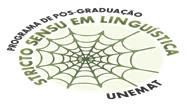Banca de QUALIFICAÇÃO: LOURDES SERAFIM DA SILVA
Uma banca de QUALIFICAÇÃO de DOUTORADO foi cadastrada pelo programa.DISCENTE : LOURDES SERAFIM DA SILVA
DATA : 26/05/2021
HORA: 08:00
LOCAL: Webconferência
TÍTULO:
LANGUAGE TEACHING IN THE BORDER REGION: AN ANALYSIS OF THE SILENCING AND SENSING PRODUCTION PROCESSESPALAVRAS-CHAVES:
Language teaching; Border; Public policy; Diversity of languages; Discourse Analysis.
PÁGINAS: 105
GRANDE ÁREA: Lingüística, Letras e Artes
ÁREA: Lingüística
SUBÁREA: Teoria e Análise Lingüística
RESUMO:
This thesis is affiliated to the line of research Studies of discursive processes, in the area of concentration: Study of linguistic processes, and aims to understand the processes of silencing and the production of meanings, in public teaching policies for basic education and in the speeches of pedagogical advisers from two border municipalities in the western region of the State of Mato Grosso. We take a look at the textualities of public policies and the speeches collected through a questionnaire sent to pedagogical advisers in the municipalities of Cáceres and Porto Esperidião, municipalities bordering Bolivia, the locus of the research. We are enrolled within the scope of the History of Linguistic Ideas, articulated with Discourse Analysis of a materialistic line, formulated by Pêcheux and other researchers, in France, and initially developed by Eni Orlandi, in Brazil, to analyze the corpus, understanding the discourse as symbolic object that produces meanings. We look at the analysis material considering the conditions of production of the speeches of the participating subjects, the relationship that the statements establish with other speeches, especially with the language teaching policies, in order to observe the discursive process in operation. Linguistic diversity in the enunciative space of the frontier requires teaching that considers the student's subjectification process instead of denying and silencing it and the clash with other languages, it also occurs and strengthens the mixtures of the various languages practiced in the region with a unique form of language usage. We realized in our research that the State produces, by the legislature, an injunction to interpretation and when thinking about policies for immigrants, it causes inequality, because it does not advance when the immigrant enters the school environment, since the daily practices in schools make it a invisible student in the absence of policies that actually address language issues imposed at the border. Bolivian subjects or descendants of Bolivians, or even Chiquitano - descendants of indigenous people - identified by the State are subjected to sharing the national language of Brazil in the Brazilian school, in a process of erasing the languages practiced in Bolivian territory.
MEMBROS DA BANCA:
Presidente - 55846009 - JOELMA APARECIDA BRESSANIN
Interno - 101625005 - FLAVIO ROBERTO GOMES BENITES
Externo ao Programa - 83230001 - SANDRA RAQUEL DE ALMEIDA CABRAL HAYASHIDA
Externo à Instituição - ELIANA STURZA - UFSM



